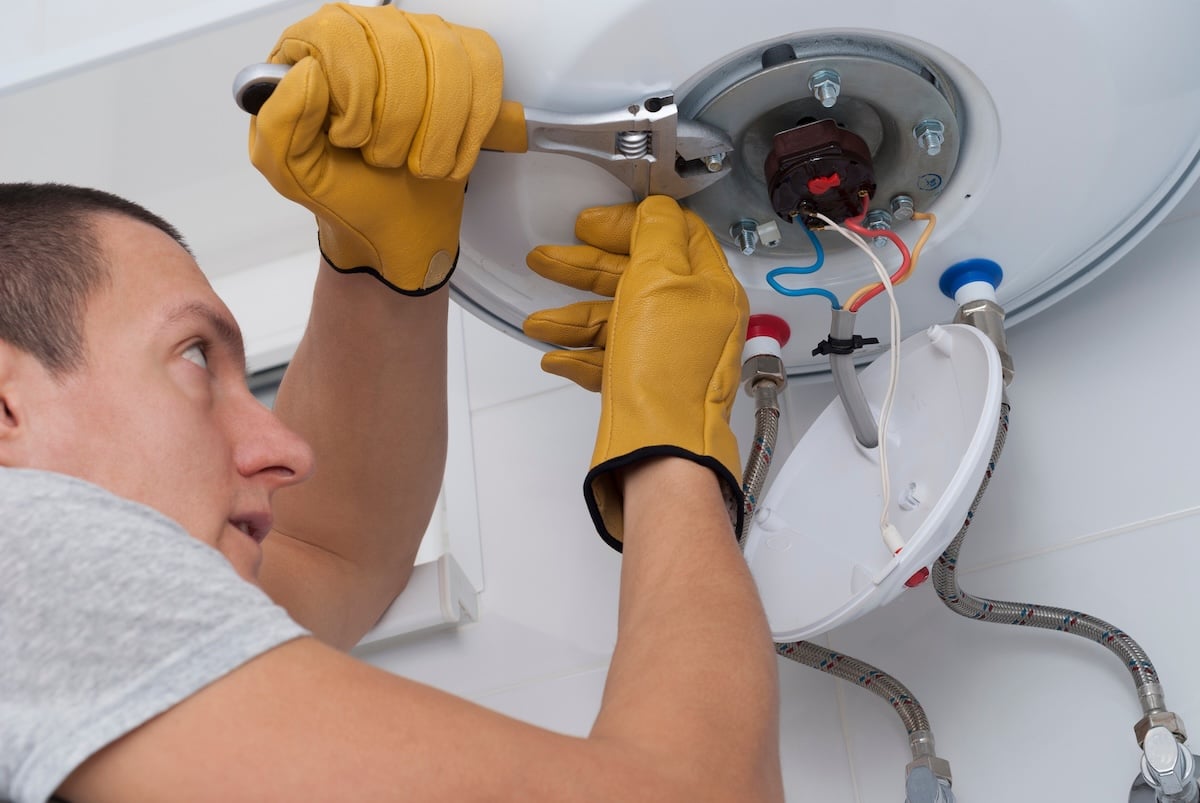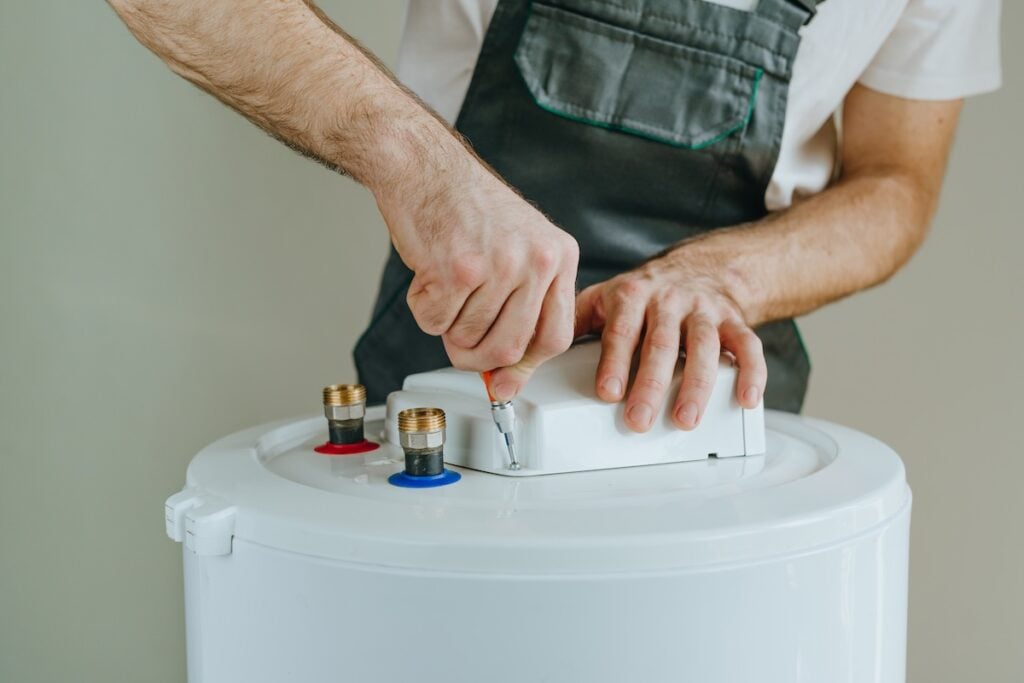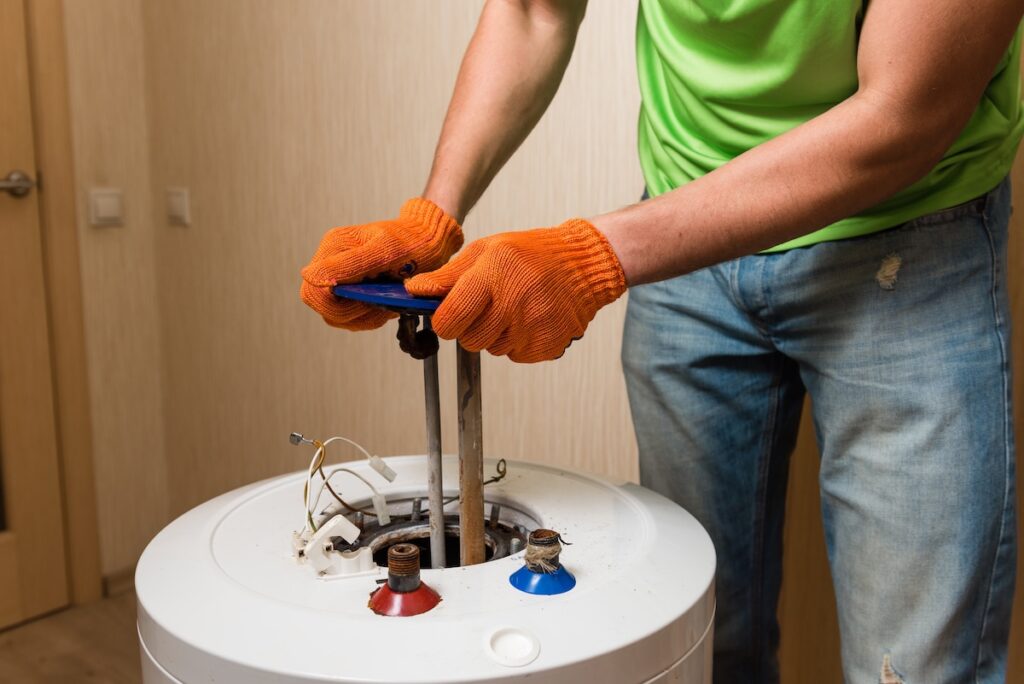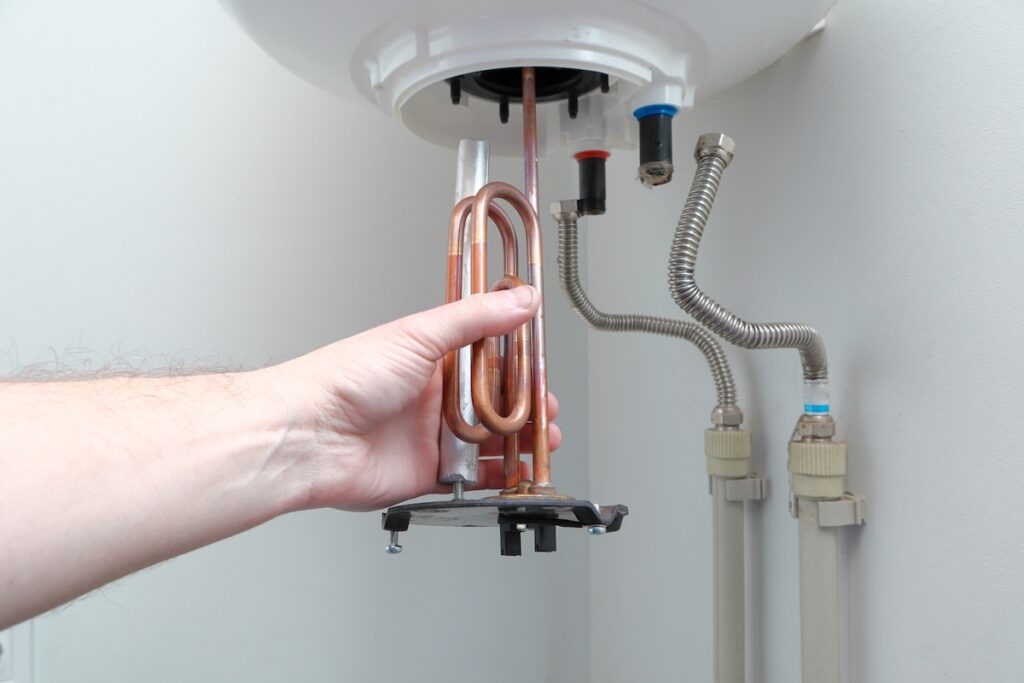


September 10, 2025
Water Heater Replacement Cost (Remove & Replace)
When your trusty water heater starts showing signs of age or stops working altogether, you’re likely wondering about the water heater replacement cost. Understanding these expenses helps you budget effectively and make informed decisions about your home’s comfort systems.
Whether you’re dealing with a completely failed unit or planning ahead for an aging water heater, replacement costs can vary significantly based on several important factors. From the type of unit you choose to labor costs in your area, we’ll break down everything you need to know about water heater replacement expenses.
This comprehensive guide covers:
- Average water heater replacement costs by type
- Key factors that influence pricing
- Labor and installation considerations
- Money-saving tips for your replacement project
- When to repair versus replace your unit
💧 Average Water Heater Replacement Costs

The water heater replacement cost depends largely on the type of unit you select. Here’s what you can expect to invest:
| Type of Water Heater | Cost | Key Features |
| Tank Water Heaters | $750-$2,000 (gas) <br> $800-$1,500 (electric) | Most popular option; standard 40-50 gallon capacity. Costs include basic installation but may exclude plumbing modifications. |
| Tankless Water Heaters | $1,000-$3,000 (electric) <br> $1,200-$3,500 (gas) | Higher upfront cost; offers long-term energy savings. Installation is more complex, leading to higher labor costs. |
| Heat Pump Water Heaters | $1,200-$3,500 | Energy-efficient; reduces monthly energy bills. Works best in moderate climates and requires proper ventilation space. |
| Solar Water Heaters | $3,000-$6,000 | Highest initial investment but offers significant long-term savings and environmental benefits with proper installation and maintenance. |
💰 7 Key Factors That Affect Water Heater Replacement Cost

Understanding what influences pricing helps you prepare for your water heater replacement project:
1. Unit Size and Capacity
The size of your water heater directly impacts both its upfront cost and its ability to meet your household’s hot water demands. Choosing the right size is crucial to avoid paying for unnecessary capacity or dealing with insufficient water when you need it most.
- Smaller households (1-2 people): A 30-gallon water heater is typically sufficient for smaller households, providing enough hot water for basic needs like showers, dishwashing, and laundry.
- Medium households (3-4 people): A 40-50 gallon tank is usually ideal, ensuring enough capacity for simultaneous water usage.
- Larger households (4-5 or more people): Families with higher water usage often require 50-60 gallon tanks or even larger to avoid running out of hot water during peak times.
- Tankless options: For homes with unpredictable water usage patterns, tankless water heaters can provide an on-demand solution, though they may cost more upfront.
2. Energy Source and Efficiency Ratings
The energy source of your water heater—whether gas, electric, or hybrid—plays a major role in operating costs and overall efficiency. Choosing a model with high efficiency can save significantly on utility bills in the long term.
- Gas water heaters: Often less expensive to operate but may require an existing gas line or an installation upgrade to accommodate one.
- Electric water heaters: Easier to install and maintain, but can have higher monthly energy costs depending on usage.
- High-efficiency models: These carry higher upfront costs but can reduce energy consumption and lower utility bills over time. Look for models with a high Uniform Energy Factor (UEF) rating.
- Energy Star certified units: These meet strict energy efficiency standards and may qualify for rebates or tax credits in some areas.
3. Installation Complexity
The complexity of the installation directly affects labor costs. A simple replacement is always cheaper than a project requiring significant modifications or installations.
- Like-for-like replacements: Replacing an existing unit with one of the same size and type is the least expensive option, as minimal adjustments are needed.
- New plumbing or electrical work: If your water heater requires upgraded connections, installation time and costs increase.
- Switching fuel types: Changing from electric to gas or vice versa adds another layer of complexity, requiring modifications like gas line installation or electrical rewiring.
- Additional venting systems: Gas water heaters often require venting upgrades to comply with safety regulations, adding to the cost.
4. Local Labor Rates
Professional installation costs vary widely depending on your geographic location and the availability of skilled labor.
- Urban areas: Labor tends to cost more in cities with higher living expenses, driving up the total cost of installation.
- Rural areas: Labor may be cheaper in less populated areas, but availability of contractors might be limited.
- Get multiple quotes: To ensure you’re getting a fair price, request estimates from multiple licensed contractors in your area.
5. Permit and Code Requirements
Replacing a water heater is often regulated by local building codes, which may require permits and inspections to ensure safety compliance.
- Municipal permits: Many cities require a permit for water heater replacements. Permit fees can range from $50 to $500 depending on your location.
- Fuel type changes: Switching from electric to gas (or vice versa) may trigger additional permit requirements and inspections.
- Building code upgrades: To meet modern safety standards, you may need to add features like earthquake straps, expansion tanks, or drain pans.
6. Additional Materials and Modifications
Depending on the condition of your current setup, your water heater replacement may require extra materials or system modifications.
- New water lines: Old or corroded pipes may need replacing to ensure compatibility with the new unit.
- Gas connections: If switching to a gas water heater, a new gas line might need to be installed or upgraded.
- Electrical upgrades: Electric water heaters may require updated wiring or circuit breaker adjustments.
- Venting modifications: Gas heaters require proper ventilation systems to safely expel exhaust gases, which might involve adding or upgrading vents.
7. Removal and Disposal Fees
Getting rid of your old water heater is another expense to consider. While some contractors include this service in their pricing, others charge extra.
- Standard removal: Many professionals charge $50-$100 to remove and dispose of old water heaters. Be sure to confirm if this fee is included in your installation quote.
- Recycling options: Some companies recycle old units, which may reduce disposal costs or offer an eco-friendly alternative.
- DIY removal: You can dispose of the old unit yourself, but check with your local waste management service for proper disposal guidelines.
👨🔧 Labor and Installation Considerations

Professional installation ensures your water heater operates safely and efficiently. Most contractors charge $300-$800 for standard tank water heater installation, while tankless units may cost $500-$1,200 in labor fees.
What Installation Includes:
- Removing your old water heater
- Connecting water supply lines
- Installing proper venting systems
- Testing for gas leaks (gas units)
- Ensuring electrical connections meet code
- Checking for proper drainage
DIY Installation Risks
While some handy homeowners consider self-installation, water heater replacement involves plumbing, electrical, and potentially gas work. Improper installation can void warranties, create safety hazards, and violate local building codes.
💵 Money-Saving Tips for Water Heater Replacement
You can reduce your water heater replacement cost with these practical strategies:
- Shop Around for Quotes: Get at least three detailed estimates to compare pricing and services from different contractors.
- Consider Timing: Off-season installations (spring and fall) can be cheaper than emergency replacements during peak summer or winter months.
- Look for Rebates and Incentives: Check for utility company rebates on high-efficiency water heaters and potential federal or state tax credits for energy-efficient models.
- Bundle with Other Services: Some contractors offer discounts when you replace your water heater alongside other plumbing or HVAC services.
🛠️ Repair vs. Replacement Decision
Sometimes repair makes more financial sense than full replacement. Consider these guidelines:
Repair When:
- Your unit is less than 8 years old
- Repair costs are under 50% of replacement cost
- The problem is isolated to specific components
Replace When:
- Your water heater exceeds 10-12 years old
- Repair costs approach replacement pricing
- You’re experiencing frequent breakdowns
- Rust or corrosion affects the tank
- Your energy bills are consistently high
👨🔧 Trust the Experts for Your Water Heater Needs
At Eric Smock Heating & Air Conditioning Inc., we’ve been serving Frederick County homeowners since 2005 with reliable water heater replacement services. Our certified technicians provide transparent pricing, quality workmanship, and complete customer satisfaction.
Don’t let an aging water heater leave your family without hot water. Contact our experienced team today for a comprehensive assessment of your water heater replacement cost and discover why local homeowners trust us for all their HVAC and plumbing needs.


